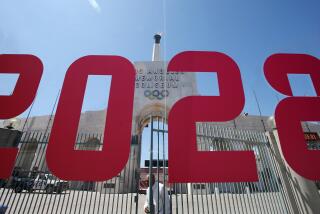Editorial: Los Angeles is right to slam the brakes on the World Cup
Los Angeles city leaders were absolutely correct to slam the brakes on bidding for soccer’s 2026 World Cup; the pressure to commit to a problematic host city agreement without enough time to thoroughly vet the outcomes was unacceptable. The demands by FIFA, the sport’s governing body, seemed to lack a basic understanding of the Los Angeles metropolitan area and its many jurisdictions, and the organization was unwilling to budge.
As a consequence, the city will miss Monday’s deadline to submit the documents required by the United Bid Committee — the group preparing the joint proposal by the U.S., Mexico and Canada — to be considered among the cities to host matches should FIFA pick North America over Morocco for the 2026 cup. But soccer fans should not despair; this is not the end of the story.
If FIFA isn’t willing to budge, city leaders must be willing to walk away rather than allow themselves to be rolled.
Mayor Eric Garcetti has obtained an extension from the bid committee, which is entirely reasonable given that the joint bid won’t be submitted to FIFA for another month. Furthermore, Los Angeles ought to be one of the strongest contenders, given its status in some circles as the nation’s top market for soccer. And the L.A. area has experience. The Rose Bowl in Pasadena has successfully hosted multiple World Cup matches, including the men’s finals in 1994 and the women’s finals in 1999 — the latter being memorable for the nail-biting win by the U.S. women’s side. There’s no good reason the bid committee shouldn’t try to work out a deal to keep L.A. in the running.
Nor is there a good reason that the city can’t work out a deal that doesn’t leave Angelenos on the hook for more than their share of the costs. After all, this is not the Olympic Games, which require a level of civic commitment and investment that far surpasses that of hosting a few soccer matches — and whose outsize budgets have a long history of leaving cities swamped in debt. That is why we expressed great concern about the city signing the host city agreement for the 2028 Summer Olympic Games. Yes, the Games hold enormous promise for the Los Angeles economy, but that is balanced by the risk associated with hosting a $5.3-billion event that requires substantial investment and relies on third parties to complete the necessary infrastructure. So much could go wrong.
The World Cup is a vastly different, less financially risky scenario for the city, and the potential benefits are worth pursuing. Los Angeles and other host cities could see an economic payoff between $90 million and $480 million after costs, according to a study released Thursday by U.S. Soccer. Even if the matches themselves are played outside city limits, L.A. would make money from the fans streaming though LAX, staying in L.A. hotels, eating in L.A. restaurants and paying hotel and sales taxes. At most, the city would be on the hook for police and other public services.
But these rosy numbers shouldn’t stop the city from driving a hard bargain. There are costs to any large-scale event, and city leaders have a responsibility to push for a fair deal for the residents. And the concerns raised by city officials in a report released Thursday are valid.
The proposed agreement would have required Los Angeles to provide police, parking and other city services at events at the Rose Bowl — a venue that everyone, except perhaps FIFA, realizes is in another city. Although Los Angeles’ name is out front, the area is offering stadiums in three other cities as well: the Rose Bowl, Stub Hub Center in Carson and the professional football stadium now being built in Inglewood. Another concern cited by city officials is that FIFA is demanding a contractual commitment yet wants to retain the right to change the terms unilaterally in ways that could potentially harm Los Angeles. When L.A. officials requested moderate amendments, FIFA said no. Sorry, but given the association’s recent corruption scandals, FIFA doesn’t have the moral authority to demand trust from host cities.
That said, these differences seem entirely surmountable over the next few weeks. But if FIFA isn’t willing to budge, city leaders must be willing to walk away rather than allow themselves to be rolled.
Follow the Opinion section on Twitter @latimesopinion and Facebook
More to Read
A cure for the common opinion
Get thought-provoking perspectives with our weekly newsletter.
You may occasionally receive promotional content from the Los Angeles Times.






